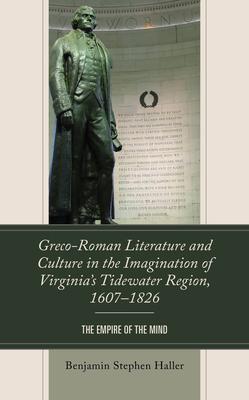This book explores the influence of classical texts upon early European settlers and inhabitants of the Tidewater region of Virginia, addressing how Greek and Roman literature and culture shaped and sometimes challenged prevailing assumptions about personhood, liberty, town planning, and representative government in Virginia during the period of its expansion from the fort at Jamestown to Thomas Jefferson’s Virginia. Benjamin Stephen Haller introduces the reader to the Ovid translation which George Sandys penned during his time in Virginia as Treasurer; William Strachey’s account of the wreck of the Sea Venture, likely one inspiration for William Shakespeare’s The Tempest; William Byrd II’s writings, including his secret diaries which record the intimate details of the life of an Indian Trader and plantation owner in the early eighteenth century; and Jefferson’s expansive Enlightenment Era appetite for knowledge classical and modern. Haller’s analysis of these texts is carefully anchored in a discussion of the cultural historical context of the Grand Tour, the excavations of Pompeii, the eighteenth-century mania for Palladian architecture, the construction of the campus of the University of Virginia, and new Enlightenment ideals of personal liberty and human rights which came to the fore during Jefferson’s lifetime, and which he helped to enshrine in modern American political thought.
| FindBook |
有 1 項符合
Greco-Roman Literature and Culture in the Imagination of Virginia’s Tidewater Region, 1607-1826: The Empire of the Mind的圖書 |
 |
Greco-Roman Literature and Culture in the Imagination of Virginia’s Tidewater Region, 1607-1826: The Empire of the Mind 作者:Haller 出版社:Lexington Books 出版日期:2024-05-03 語言:英文 規格:精裝 / 422頁 / 普通級/ 初版 |
| 圖書館借閱 |
| 國家圖書館 | 全國圖書書目資訊網 | 國立公共資訊圖書館 | 電子書服務平台 | MetaCat 跨館整合查詢 |
| 臺北市立圖書館 | 新北市立圖書館 | 基隆市公共圖書館 | 桃園市立圖書館 | 新竹縣公共圖書館 |
| 苗栗縣立圖書館 | 臺中市立圖書館 | 彰化縣公共圖書館 | 南投縣文化局 | 雲林縣公共圖書館 |
| 嘉義縣圖書館 | 臺南市立圖書館 | 高雄市立圖書館 | 屏東縣公共圖書館 | 宜蘭縣公共圖書館 |
| 花蓮縣文化局 | 臺東縣文化處 |
|
|
圖書介紹 - 資料來源:博客來 評分:
圖書名稱:Greco-Roman Literature and Culture in the Imagination of Virginia’s Tidewater Region, 1607-1826: The Empire of the Mind
|








 2026【圖表整理+最新法規】勞工行政與勞工法規大意--看這本就夠了[十六版](初等考試/五等特考)](https://media.taaze.tw/showLargeImage.html?sc=14100124102)

